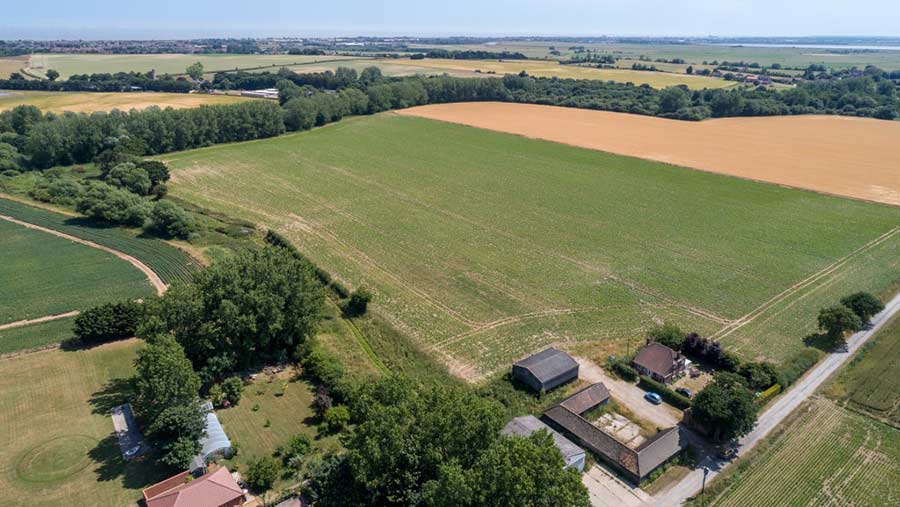Expert advice on tendering for a farm tenancy ahead of Brexit
 Upper Wood Farm, a Norfolk County Council tenancy
Upper Wood Farm, a Norfolk County Council tenancy Scrutinising tenancy agreements, checking break clauses and taking on critical business planning are all key to submitting a tender amid the Brexit turmoil.
Despite the uncertainties, there has been a steady flow of holdings to let, according to Kathryn Williams, land agent at Davis Meade Property Consultants.
Many of these have tenancy commencement dates around the time of the UK’s proposed departure from the European Union.
See also: Expert tips on how to apply for a farm tenancy
Others will begin weeks, months and even years after Brexit, but have tender deadlines in the months previous.
Deciding on a level of rent that is sustainable, and not overestimating the rental value in an attempt to win the farm, can be difficult at the best of times.
In a time of political, social and financial uncertainty, this task becomes even more challenging.
Tender checklist
Due to ambiguity over future trade deals, the loss of the Basic Payment Scheme (BPS), and the introduction of new Environmental Land Management Schemes (Elms), compiling a competitive yet financially viable tender is tricky, says Ms Williams.
“As none of us are able to accurately predict market prices for the forthcoming years, all that farmers can do is ensure there are provisions in place should prices fall dramatically,” she advised.
See also: Five farm tenancies open for tender in Cambridgeshire
“Prospective tenants should always insist on seeing a draft copy of the tenancy agreement prior to submitting a farm tender.
“Within the tenancy agreement, farmers should pay particular attention to break clauses [which allow them to quit before the term is up], and rent review provisions, including timings for reviews, and the basis for the review.”
Other points to consider include: repairing obligations, as this could have an effect on costs, and BPS clauses, including whether the tenant is obliged to purchase entitlements from the outgoing tenant or landlord.
There may also be liabilities in terms of maintaining entitlement units or obligations regarding those units at the termination date.
The importance of break clauses
“Break clauses are particularly important in the current climate and prospective tenants should look at the proposed tenancy agreement to see whether these are in place for both parties, not just the landlord,” said Ms Williams.
“If the tenancy agreement contains no tenant break clause then you are signing up to pay the tendered sum for the entire term, subject to other clauses within the agreement.”
See also: 4 farmers tell us how they secured county council tenancies
A tenant farmer with a break clause date should be aware that there are strict terms regarding the times at which a notice must be served on the landlord to be able to exercise this clause.
This often involves service of a notice to terminate the agreement at least 12 months prior to the break clause date.
Duncan Slade, Norfolk County Farms manager, said no changes are planned for the county council’s farms’ tenancies ahead of Brexit, but this will be kept under review. Currently tenants have the option to end their tenancy agreements each year.
Business advice for county farms
Business plans must be included as part of the tenancy application process.
“It would be a sensible business aim to have at least 30% of turnover from non-farming enterprises to help smooth out the peaks and troughs associated with agricultural commodities,” Duncan Slade, Norfolk County Farms manager said.
“Business planning will become an even more critical management tool than it is now. We will want to see well-balanced businesses that know and understand their costs of production, seek to minimise their overheads, undertake benchmarking, and consider collaborative working.”
Ms Williams agreed, adding that farmers should model the likely effect of the reduction of BPS payments on their forecast cashflow to ensure the farm can remain viable.
“We would recommend that a worst-case scenario is budgeted for to ensure the farm can withstand product sale price reductions, certainly within the 20% range, if not more,” she said.
See also: How to become a county council farm tenant
Advice for would-be tenants
County farms are often smaller holdings, and in Norfolk the average size is around 200 acres. Therefore, it is critical that applicants do not focus on broad-acre cropping, which even now is barely viable, Mr Slade advised.
However, he said being small can be an advantage, as farmers can focus on details and getting basics right in order to produce a quality product.
Specialising in niche areas, such as non-food crops, is one option, and smaller farmers can be more timely and adaptable to changes that affect their business.
“Above all, the success or failure of a farm business will hinge on the individual, who will need to have the right attitude – a positive outlook, desire to get on and sheer determination to succeed,” Mr Slade said.
On Monday 21 January, four 10-year farm business tenancies opened for tender in Norfolk.
See also: Four 10-year farm tenancies up for grabs in Norfolk
Mr Slade, who plays a key role in finding the best potential applicant for any farm on offer, said he would be keen to see applications that capitalise on niche markets, such as novel crops, or develop alternative enterprises.
“My council is prepared to support tenants with capital investment where required and where there is a sound business plan to support that investment,” he said.
“This is a way to support our tenants through what are likely to be turbulent times, while also creating additional revenue streams for the authority.”
Applicants should also give meaningful thought to the farming environment in order to be best placed for taking advantage of Elms as and when they are rolled out.
